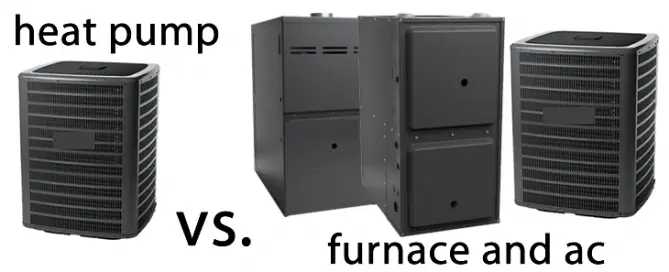
Heat Pump vs. Furnace : Which Should I Choose?
Whether you're looking to upgrade or building a new home, furnaces and heat pumps have just what you need to keep your family cozy throughout the winter. Both have their pros and cons, so deciding which unit is right for your home may take some careful consideration.
What's the Difference Between a Furnace and a Heat Pump?
Before weighing in on which unit is perfect for your home, it's important to understand the differences between a furnace and a heat pump. A furnace is the traditional heating method for most northern homes because it's able to brave temperatures from mild to freezing. A furnace burns oil or gas to provide heat, which it blows into the home.
Heat pumps are popular in Texas and throughout the South, namely because they're aptly powered to handle milder climates. They produce heat by using a refrigerant and electricity to transfer heat from the outdoors into your home. The best way to understand the idea of heat pumps is by thinking of the unit as an air conditioner working in reverse.
Efficiency Considerations
Now that you have the basic idea of how furnaces and heat pumps work, it's time to look at their benefits. One of the most significant considerations is efficiency. However, this isn't as easy as it seems, because each unit uses a different type of efficiency measurement.
The efficiency of a furnace is measured by a rating called the Annual Fuel Utilization Efficiency, or AFUE. This number shows what percentage of fuel burned actually heats the home. For example, a high-efficiency furnace would have a 90 AFUE rating. This means that 90 percent of the fuel burned goes to heating the home with only 10 percent waste.
A heat pump, however, uses a Seasonal Energy Efficiency Ratio, or SEER. This is the same rating used by air conditioners because it's basically an air conditioner working in reverse. Most heat pumps have a SEER rating between 14 and 16, with 20 being the maximum for a majority of residential construction.
For central and southern Texas homes, a heat pump is usually the better choice. This is because they heat the home to your exact specifications without any waste, and more efficiency translates to fewer heating repairs and lower bills. Furnaces may heat the home more quickly, but because they're meant for colder climates, they aren't as efficient as a heat pump.
Versatility
Another aspect of choosing between furnaces and heat pumps lies in their versatility. A furnace is a solid choice because it typically gives you three ways to heat your home: gas, oil, or electricity. Natural gas is one of the cheapest choices, simply because its cheaper than both oil and electricity. Oil is an old school method, and requires a delivery of fuel every few months. It's more expensive than other fuel sources, and the delivery fees make it the most expensive. Electric furnaces have become very popular because they don't require an extra fuel source.
Heat pumps are also highly versatile, but it's not based on power sources. All heat pumps use electricity to heat homes, but they can also reverse their heating process, essentially turning them into an air conditioner. This eliminates the need for both an air conditioner and furnace in the home, freeing up interior and exterior space to use to your liking. There's no lapse in home comfort either, and you'll enjoy great temperatures all year long.
As you can see, both furnaces and heat pumps have amazing qualities, and there's no right or wrong choice for your Texas home. Now is the perfect time to consider which would be the best choice for your home, before the cooler temperatures start in fall. Once you've decided on one or the other, it's time to give us a call at All Pro AC (254) 624-4917
The post Heat Pump vs. Furnace : Which Should I Choose? appeared first on All Pro A/C.